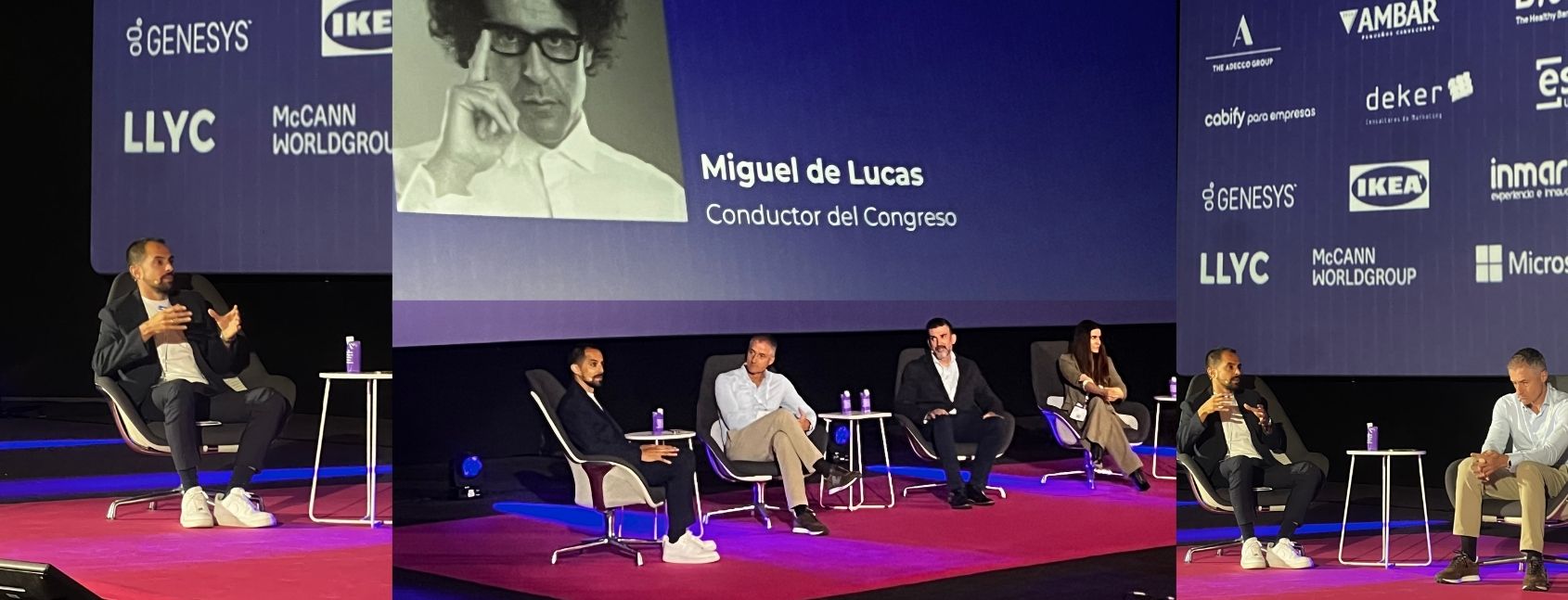
-
CountriesGlobalSpain
Last week, Jesús Moradillo, partner and Managing Director Marketing Solutions Strategy had the privilege of moderating the round table discussion entitled “THE CMO FACING HIS ENCRUCIJADA: THE FUTURE OF THE ROLE AND THE RELATIONSHIP WITH STAKEHOLDERS ” during the International Congress of Marketing and Sales organized by APD.
During the event, the discussion focused mainly on the radical changes in the marketing ecosystem that are affecting the role of the CMO and its implications for the industry. The table included the presence of prominent marketing leaders such as Sergio Elizalde, CEO of Agora Group; Laura Puente, Marketing Director of OpenBank; Alfonso Fernández, Marketing Director of Samsung; and Basilio Grande, Commercial Director of Jamones Aljomar.
Jesús divided the session into 4 topics: the new roles of the CMO, the impact of AI on agency capabilities and marketing teams, how corporate moves by agencies are affecting CMOs’ choice of the right partner and, finally, how marketing directors are setting up hybrid teams between external and internal collaborators to obtain the greatest return by guaranteeing innovation and flexibility.
Below are the key learnings from each of these topics:
The New Roles of the CMO
The role of the CMO has evolved dramatically, taking on a critical dual responsibility: leading the adoption of advanced technologies and advocating for the interests of an increasingly informed consumer. This new role demands not only technological innovation, but also the ability to align the entire organization around a consistent customer experience.
Sergio Elizalde indicated that this is clearly a responsibility of the CMO and affirmed that at Agora they have implemented integration programs to break down organizational silos, because they must be broken down. Laura Puente pointed out that at OpenBank, collaboration with external partners is crucial to design seamless customer experiences, although the responsibility should really be the CEO’s. Alfonso Fernández stressed the importance of fostering a customer-centric culture within the C-Suite.
The conclusion is clear: CMOs must lead initiatives that promote internal and external collaboration, generating alliances between board members and thus ensuring consistent and satisfying customer experiences. This requires a strategic vision and the ability to influence all levels of the organization.
Impact of AI on Agency Capabilities and Marketing Teams
Artificial intelligence (AI) is revolutionizing marketing teams and agencies, offering unprecedented opportunities to automate processes, personalize interactions and optimize campaigns. Agencies that invest in AI are uniquely positioned to deliver more efficient and effective marketing services to their clients, increasing both customer satisfaction and returns on investment.
The use of AI is also changing the nature of the relationship between agencies and their clients. Agencies that invest in AI technologies can offer more advanced and differentiated services, which can strengthen their relationship with clients. However, this can also change remuneration models. Instead of relying on fixed fees or budget percentages, agencies could adopt performance-based models, where compensation is directly linked to the results achieved using AI tools.
In addition to using packaged solutions, many agencies are investing heavily in research and development (R&D) and technical resources to develop AI-based tools specifically for ad optimization and production. For example, our agency invested nearly €1.5 million last year in developing AI solutions. These investments are aimed at creating automations and efficiency improvements that allow us to offer a higher quality and more effective service to our clients.
Reorganization of the Advertising Marketing Industry
The traditional boundaries between creative agencies, media agencies, consultancies and tech partners are becoming increasingly blurred. The consolidation of services under one roof is redefining the marketing landscape. Agencies are looking to integrate creative, media buying and consulting services to offer more holistic solutions.
Sergio Elizalde pointed out that the most important thing is to be daring and look for a partner that will help them to take new paths, which is not found in large groups because they are full of gray people who do not have the courage to try different things. Laura Puente said that at OpenBank they value specialization, although they appreciate the integration of services as long as they maintain high quality standards. Alfonso Fernández pointed out that at Samsung they prefer partners with integrated capabilities that ensure consistency and efficiency in their campaigns. They also work with international agencies that are agreed from the head office.
This trend towards consolidation and integration of services is seen as an opportunity to improve efficiency and strategic coherence. However, quality and specialization remain crucial.
Team and Partner Configuration
According to McKinsey’s annual survey of global CMOs, the distribution of the marketing budget is almost equally balanced between external services, internal teams and media spend. This has not shifted in recent years, but the capabilities of internal teams and those sought outside have fluctuated.
The bottom line is that brands are seeking a balance between internalizing key functions and relying on external partners for specialized areas, thus ensuring a combination of innovation and operational efficiency. Creativity, planning and technology functions are the ones they will be looking to outsource the most.
Final Reflection
CMOs are at a critical point where they must lead not only in technology innovation and consumer advocacy, but also in creating strategic alliances inside and outside the organization. Collaboration and service integration will be essential to meet future challenges and build long-term brand loyalty.
This event reaffirmed that, for today’s CMOs, the ability to adapt and lead in an ever-changing environment is essential. The combination of technology, collaboration and a customer-centric approach will be the key to success in the future of marketing.
This content is translated with AI.



